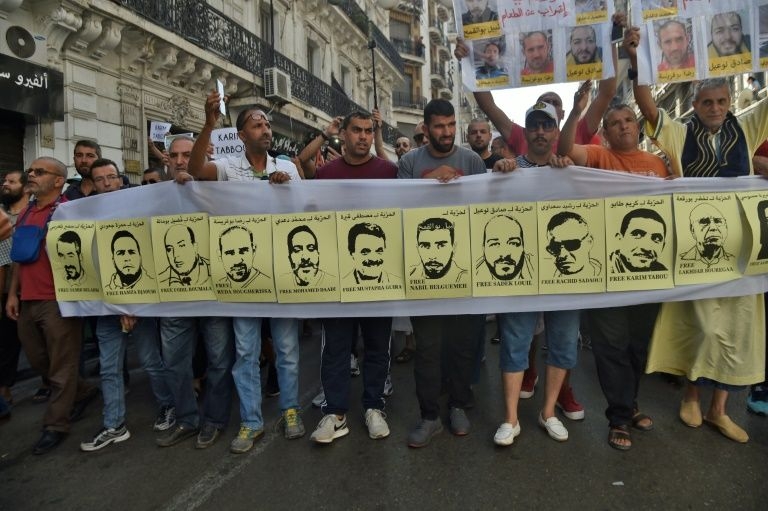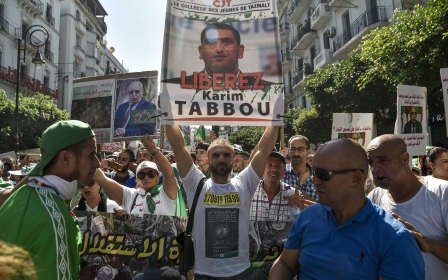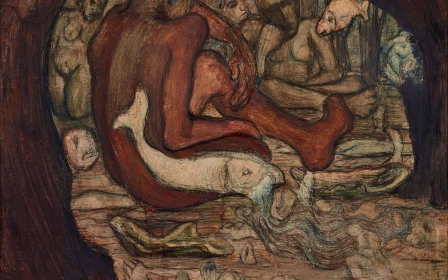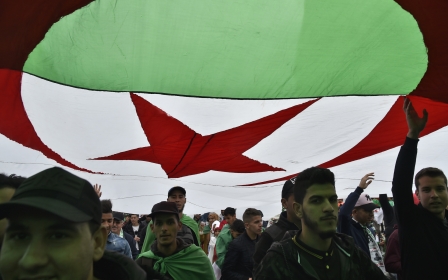Leading Algerian activist jailed as crackdown on opposition continues

The sentencing of yet another leading figure close to Algeria's anti-government movement has sparked an outcry, as authorities continue their clampdown on opposition figures and journalists despite the coronavirus pandemic.
The Sidi M'hamed court in Algiers on Monday sentenced Abdelouahab Fersaoui, head of the civic group Youth Action Rally (RAJ) and a leading activist of the popular movement, to one year in prison.
Fersaoui was arrested in October 2019 during a demonstration in support of detainees, after being accused of attacking “the integrity of the national territory" with a Facebook post that criticised the crackdown on the anti-government uprising and called for a democratic transition.
"The sentencing of comrade Abdelouahab is a heinous act and a crime against every Algerian citizen and a crime against the peaceful struggle," RAJ said in a statement after the verdict.
"History will bear witness to the revenge policy of the regime."
Online prisoner support group, the National Committee for the Liberation of Detainees, described the sentencing as "heavy" and condemned the judicial harassment "against activists and detainees during this period of citizen confinement".
According to the rights group, 44 people linked to the Hirak - another name for the popular movement - are currently imprisoned, with hundreds having been arrested and detained since the crackdown in June 2019.
"Abdelouahab Fersaoui didn't steal, didn't kill and if he had been corrupt and working for your interests, you would have paid him off," Fersaoui's wife said after his sentencing.
"His only wrongdoing is believing in a new Algeria and freedom,” she added.
Said Salhi, vice president of the Algerian League for the Defence of Human Rights, who had expected Fersaoui to be released, said the ruling confirmed "concern about the risk of escalating repression”.
Meanwhile, lawyer Fetta Sadat condemned the judicial system as a tool used "by certain parties to repress and scare the Algerian people”.
Crackdown continues despite pandemic
Activists also criticise Algeria for cracking down on opposition figures amid the global outbreak of coronavirus.
While Algerians have been confined to their homes and have temporarily suspended demonstrations over fears of contracting the virus, authorities have extended the imprisonment of opposition leaders, detained prominent journalists and summoned for questioning dozens of political activists.
"At a time when the Covid-19 pandemic is prompting governments around the world to consider early release of prisoners, the authorities have decided to detain and convict people solely for exercising their rights to liberty of expression,” Hassina Oussedik, director of Amnesty International Algeria, said.
Last month, after Algeria reported a spike in infection cases, demonstrators suspended their weekly marches against the ruling elite, heeding a presidential order aimed to contain the spread of the virus.
Unrelenting suppression
Fersaoui's sentencing came one day after a journalist was handed an eight-month prison term for providing images of national protests to foreign media outlets.
Sofiane Merakchi, a correspondent for the Lebanese TV channel Al-Mayadeen, was also accused of "concealment of equipment” while covering the weekly protests.
Merakchi was one of the first journalists to be arrested back in September 2019 and is expected to be released next month after having served the majority of his sentence.
In March, prominent political activist Karim Tabbou, whose trial was scheduled to take place yesterday but has been postponed until 27 April, was summoned before a judge for a surprise trial his lawyers were not informed of, three days before he was to be released.
His imprisonment was extended by another year and he will likely spend six more months in prison despite his ailing health, which had worsened in prison to near paralysis.
Khaled Drareni, an Algeria correspondent for Reporters Without Borders who has covered the protests extensively since they first began on 22 February 2019, has also been detained since last month awaiting trial.
Last week, Algerian President Abdelmadjid Tebboune announced the release of over 5,000 prisoners to prevent the spread of the virus in prisons. However, the pardon was not extended to any of the political detainees incarcerated.
Algeria is Africa’s worst-affected country in the coronavirus pandemic, with over 1,400 cases reported and 173 deaths.
On Monday, the North African country's youngest Covid-19 victim, aged nine, died in the city of Ouargla, while an 18-month-old baby tested positive for the virus in the eastern city of Skikda.
The ongoing crackdown, combined with food shortages and ramped up prices of essential goods amidst an economic crisis, are behind growing fears that the Algerian government's inadequate response to the pandemic could provoke major social unrest.
Middle East Eye delivers independent and unrivalled coverage and analysis of the Middle East, North Africa and beyond. To learn more about republishing this content and the associated fees, please fill out this form. More about MEE can be found here.




